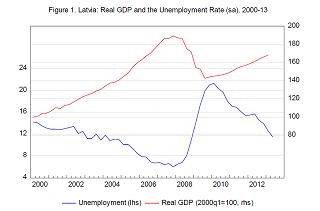Παγουλάτος, Γ., (2013), “Μετά τη Σκόνη”, Η Καθημερινή, 29 Σεπτεμβρίου. Η δολοφονία του Παύλου Φύσσα και οι καταιγιστικές εξελίξεις που την ακολούθησαν σάρωσαν το πολιτικό σκηνικό με έναν τρόπο τραγικό και συνάμα αποκαλυπτικό, σχεδόν εξυγιαντικό. Τρία χρόνια τώρα η χώρα σπαράσσεται από μια ακραία ρητορική μηδενιστικής σύγκρουσης και τυφλής οργής, που χτίστηκε στην κοινωνική ανασφάλεια και την απόγνωση της οικονομικής κατάρρευσης. Η σκόνη της σύγχυσης και ο ακραίος λαϊκισμός είχαν …Read More
Germany as Currency Manipulator
Krugman, P., (2013), “Germany as Currency Manipulator”, The New York Times, The Conscience of a Liberal Blog, 27 Σεπτεμβρίου. […] The general point is that if we imagine a euro breakup, I think everyone would agree that the new mark would soar in value, making German manufacturing much less competitive. The German public imagines that it is being cruelly exploited for the benefit of lazy southerners; arguably, what’s really happening …Read More
As good as it gets in Latvia?
Hugh, E., (2013), “As good as it gets in Latvia?”, Fistfulofeuros Blog, 29 Σεπτεμβρίου. “This raises a final question, which, while not central to the issues of this paper, is nevertheless intriguing: How can a country with a low minimum wage, weak unions, limited unemployment insurance and employment protection, have such a high natural rate [of unemployment]?” “To summarize, the actual unemployment rate is still probably higher than, but close …Read More
Notes on Internal Devaluation
Lizoain, D., (2013), “Notes on Internal Devaluation”, Social Europe Journal, 27 Σεπτεμβρίου. The Spanish government’s formula for exiting the crisis is called an internal devaluation. This is a euphemism. They are attempting a generalized reduction in wages that requires a weakening of collective bargaining. For this reason, it is worthwhile to explore the concept of internal devaluation in more detail. The theory and the historical evidence is profoundly weak. In …Read More
Νέο «mea culpa» από το ΔΝΤ για την πολιτική της σκληρής λιτότητας
Χρυσολωράς, Ν., (2013), “Νέο «mea culpa» από το ΔΝΤ για την πολιτική της σκληρής λιτότητας”, Η Καθημερινή, 27 Σεπτεμβρίου. Νέα έκθεση του Διεθνούς Νομισματικού Ταμείου, η οποία δημοσιεύθηκε χθες, αμφισβητεί εμμέσως την πολιτική που εφαρμόστηκε στη Νότια Ευρώπη –και ειδικά στην Ελλάδα– κατά τη διάρκεια της κρίσης. Η μελέτη, η οποία εξετάζει τις επιτυχείς περιπτώσεις μείωσης του δημοσίου χρέους σε ανεπτυγμένες οικονομίες, τα τελευταία 30 χρόνια, καταλήγει στο συμπέρασμα ότι …Read More
Μεταρρύθμιση στο Δημόσιο: Απλά τα πράγματα
Μπαλτάς, Ν., (2013), “Μεταρρύθμιση στο Δημόσιο: Απλά τα πράγματα”, Capital.gr, Με Άποψη, 27 Σεπτεμβρίου. Προ ημερών δύο ιστορικά Πανεπιστήμια ανακοίνωσαν ότι αναστέλλουν τη λειτουργία τους λόγω έλλειψης προσωπικού, εξαιτίας της συμμετοχής των υπαλλήλων τους στο πρόγραμμα διαθεσιμότητας. Η μεταρρύθμιση του Δημοσίου τομέα είναι ουσιαστικά η μοναδική δουλειά που έπρεπε να έχει γίνει από τότε που ξεκίνησε η κρίση. Κι όχι μόνο δεν έχει γίνει τίποτα ακόμη, αλλά αφήνουν το χρόνο …Read More
Until Angela Merkel forms a governing coalition, Greece will continue to be in limbo
Exadaktylos, T., (2013), “Until Angela Merkel forms a governing coalition, Greece will continue to be in limbo”, European Politics and Policy Blog, 27 Σεπτεμβρίου. Following last weekend’s German elections, Theofanis Exadaktylos writes on the Greek reaction to Angela Merkel’s victory. He notes that the elections received extensive coverage in the Greek media due to their implications for the country’s economic crisis. Nevertheless, the general perception is that Germany is unlikely …Read More
Dealing with High Debt in an Era of Low Growth
Ali Abas, S.M., Akitoby, B., Andritzky, J.R., Berger, H., Komatsuzaki, T. and Tyson, J., (2013), “Dealing with High Debt in an Era of Low Growth”, IMF Staff Discussion Note, SDN/13/07, Σεπτέμβριος. Τask has become particularly challenging in European advanced economies where expectations of low growth and limits to monetary policy support are shifting the burden of adjustment onto fiscal consolidation. The SDN will investigate the main drivers behind successful past …Read More
The Sovereign Debt Crisis: Placing a curb on growth
Brender, A., Pisani, F. and Gagna, E., (2013), The Sovereign Debt Crisis: Placing a curb on growth, Brussells: Centre for European Policy Studies (CEPS). This book provides an update to the major 2012 study by the same authors on the dual role of the public sector as the provider of the ultimate riskless asset and, at the same time, the source of a potential major systemic risk. In this second …Read More
Toward A Fiscal Union for the Euro Area
Allard, C., Brooks, P.K., Bluedorn, J.C., Bornhorst, F., Ohnsorge, F. and Christopherson Puh, K.M., (2013), “Toward A Fiscal Union for the Euro Area”, IMF Staff Discussion Note, SDN/13/09, Σεπτέμβριος. The crisis has exposed a critical gap in EMU: the capacity for country-level shocks, whether exogenous or home-grown, to spread across the euro area, calling into question the viability of the common currency. This paper explores the role that deeper fiscal …Read More






